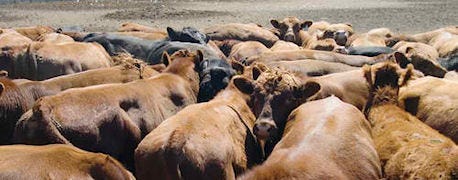August 9, 2013

by Alan Newport and Andy Vance
On Thursday the country's second-largest beef processor announced it would suspend purchase of cattle fed zilpaterol hydrochloride because of animal welfare concerns.
Tyson Fresh Meats, in a letter to cattle feeders, said its action would be effective Sept. 6, 2013.
Tyson said it would suspend purchases of cattle fed the supplement as an interim measure while the company assesses animal welfare concerns related to the additive. Tyson Fresh Meats has 17 production sites throughout North America and employs nearly 41,000 workers.

Beginning September 6 Tyson Fresh Meats says it will suspend buying cattle fed Zilmax while examining potential animal welfare issues.
By afternoon the manufacturer of zilpaterol, known commercially as Zilmax, fired off a response. Merck Animal Health said the benefits and safety of Zilmax are well documented. The company noted that its product has a 30-year history of research and development and rigorous testing, and that regulatory agencies around the globe have reviewed extensive data and concluded that use of Zilmax according to the label is safe in cattle.
Beta-agonists are feed additives which cause cattle to put on more muscle and less fat late in the feeding period when animals' tendency is the opposite. Many cattle feeders consider beta-agonists to provide a high return on investment.
Anecdotal evidence
Tyson's letter laid out this line of reasoning: "There have been recent instances of cattle delivered for processing that have difficulty walking or are unable to move. We do not know the specific cause of these problems, but some animal health experts have suggested that the use of the feed supplement Zilmax is one possible cause."
Tyson added, "This is not a food safety issue. It is about animal well-being and ensuring the proper treatment of the livestock we depend on to operate."
These animal welfare issues were a hot topic among panelists Wednesday at a symposium on the use of beta-agonists in Denver, Colorado. The symposium was hosted by the Cattlemen's Beef Board and National Cattlemen's Beef Association during the Cattle Industry Summer Conference.
~~~PAGE_BREAK_HERE~~~
Beta-agonists as the cause of welfare issues there were described by some panelists as "anecdotal."
Lily Callaway, a member of JBS's animal welfare team, told the symposium her company was also seeing increased incidences of ambulatory stress in steers delivered to the company's processing facility. JBS may be the nation's largest beef packer following its January acquisition of XL Foods. Callaway said the company slaughters 18,000 fed cattle per day.
"Truck drivers have indicated that there is a difference between loading cattle depending on the beta-agonist status of the diet," Callaway explained. "Our plants have indicated that particular lots of cattle are showing up as 'tender footed,' they do not want to move, seem lethargic and stiff and have no energy."
Callaway, who completed her Ph.D. under animal welfare expert Temple Grandin, showed a video of stressed cattle unloaded at a JBS facility, depicting animals that did not respond with a typical flight response to workers' attempts to move the animals through the facility, and appeared to move uncomfortably on their feet and legs.
Data compiled at two JBS facilities appeared to support Callaway's comments on animal movement issues. In one example, of 8,000 head processed over three shifts, at least 20% were classified as "difficult to move," 82% of which were fed beta-agonists. At least 35% of the cattle slaughtered at the facility during the reference time period were fed a beta-agonist.
In a second example, 4,300 head were processed over two shifts at a different JBS plant. In that instance 28% were "difficult to move," and 92% of those were fed beta-agonists. Callaway said at least 47% of the cattle slaughtered in this time period were fed beta-agonists.
Beta-agonists are fed to cattle only in the final 20-40 days on feed, according to federal regulations. Zilmax has a three-day withdrawal period prior to slaughter. The other beta-agonist on the market, Optaflexx from Elanco, does not have a withdrawal period.
Merck's position
Merck responded: "We are confident that, based on all of the available data on ZILMAX, the experience reported by Tyson is not attributable to ZILMAX. Indeed, Tyson itself points to the fact that there are other possible causes and that it does not know the specific cause of the issues it recently experienced."
Merck said its safety data "included rigorous animal health safety and well-being studies - conducted by university experts" and this data showed the behavior and movement of cattle fed Zilmax is normal.
"Merck Animal Health has offered technical assistance, both internal and external experts, to help Tyson to understand what is behind the instances at its facility," said Merck officials. "Merck Animal Health is confident in the extensive research and data behind the product and the fact that its safety has been well demonstrated."
Vance is livestock editor for Feedstuffs weekly agribusiness newspaper.
You May Also Like




